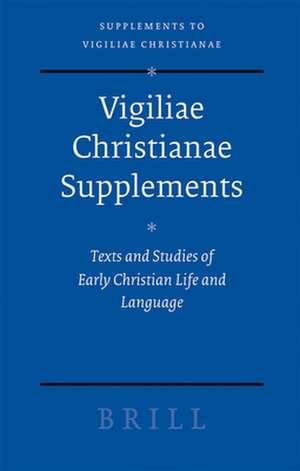Human Nature in Gregory of Nyssa: Philosophical Background and Theological Significance: Vigiliae Christianae, Supplements, cartea 46
Autor Johannes Zachhuberen Limba Engleză Hardback – 18 noi 1999
Starting from an overview of the theological landscape in the early 360's the study first demonstrates the meaning and relevance of universal human nature as an analogy for the Trinity in Cappadocian theology. The second part explores Gregory's use of this same notion in his teaching on the divine economy. It is argued that Gregory takes this philosophical theory into the service of his own theology.
Ultimately the book provides an example for the mutual interaction of philosophy and Christian theology in the fourth century.
Din seria Vigiliae Christianae, Supplements
- 18%
 Preț: 686.12 lei
Preț: 686.12 lei - 18%
 Preț: 926.43 lei
Preț: 926.43 lei - 18%
 Preț: 997.45 lei
Preț: 997.45 lei - 18%
 Preț: 1348.32 lei
Preț: 1348.32 lei - 18%
 Preț: 630.44 lei
Preț: 630.44 lei - 18%
 Preț: 817.64 lei
Preț: 817.64 lei - 18%
 Preț: 732.43 lei
Preț: 732.43 lei - 18%
 Preț: 927.95 lei
Preț: 927.95 lei - 18%
 Preț: 806.59 lei
Preț: 806.59 lei - 18%
 Preț: 1282.55 lei
Preț: 1282.55 lei - 18%
 Preț: 706.53 lei
Preț: 706.53 lei - 18%
 Preț: 706.15 lei
Preț: 706.15 lei - 18%
 Preț: 1014.71 lei
Preț: 1014.71 lei - 18%
 Preț: 749.24 lei
Preț: 749.24 lei - 18%
 Preț: 717.44 lei
Preț: 717.44 lei - 18%
 Preț: 610.67 lei
Preț: 610.67 lei - 18%
 Preț: 804.63 lei
Preț: 804.63 lei - 18%
 Preț: 1029.83 lei
Preț: 1029.83 lei - 18%
 Preț: 1031.37 lei
Preț: 1031.37 lei - 18%
 Preț: 887.26 lei
Preț: 887.26 lei - 18%
 Preț: 630.44 lei
Preț: 630.44 lei - 18%
 Preț: 633.55 lei
Preț: 633.55 lei - 18%
 Preț: 1348.79 lei
Preț: 1348.79 lei - 18%
 Preț: 1577.75 lei
Preț: 1577.75 lei - 18%
 Preț: 691.47 lei
Preț: 691.47 lei - 18%
 Preț: 1055.42 lei
Preț: 1055.42 lei - 18%
 Preț: 837.06 lei
Preț: 837.06 lei - 18%
 Preț: 1406.94 lei
Preț: 1406.94 lei - 18%
 Preț: 636.16 lei
Preț: 636.16 lei - 18%
 Preț: 1323.90 lei
Preț: 1323.90 lei - 18%
 Preț: 715.56 lei
Preț: 715.56 lei - 18%
 Preț: 575.43 lei
Preț: 575.43 lei - 64%
 Preț: 635.76 lei
Preț: 635.76 lei - 18%
 Preț: 789.52 lei
Preț: 789.52 lei - 18%
 Preț: 714.86 lei
Preț: 714.86 lei - 18%
 Preț: 867.85 lei
Preț: 867.85 lei - 18%
 Preț: 807.36 lei
Preț: 807.36 lei - 18%
 Preț: 1349.25 lei
Preț: 1349.25 lei - 18%
 Preț: 661.51 lei
Preț: 661.51 lei - 18%
 Preț: 626.27 lei
Preț: 626.27 lei - 18%
 Preț: 819.57 lei
Preț: 819.57 lei - 18%
 Preț: 764.80 lei
Preț: 764.80 lei - 18%
 Preț: 703.14 lei
Preț: 703.14 lei - 18%
 Preț: 703.08 lei
Preț: 703.08 lei - 18%
 Preț: 570.34 lei
Preț: 570.34 lei - 18%
 Preț: 576.75 lei
Preț: 576.75 lei - 18%
 Preț: 1089.66 lei
Preț: 1089.66 lei - 18%
 Preț: 763.63 lei
Preț: 763.63 lei - 18%
 Preț: 1832.55 lei
Preț: 1832.55 lei - 18%
 Preț: 1093.49 lei
Preț: 1093.49 lei
Preț: 781.94 lei
Preț vechi: 953.58 lei
-18% Nou
Puncte Express: 1173
Preț estimativ în valută:
149.65€ • 155.04$ • 124.89£
149.65€ • 155.04$ • 124.89£
Carte indisponibilă temporar
Doresc să fiu notificat când acest titlu va fi disponibil:
Se trimite...
Preluare comenzi: 021 569.72.76
Specificații
ISBN-13: 9789004115309
ISBN-10: 9004115307
Pagini: 271
Dimensiuni: 155 x 240 x 24 mm
Greutate: 0.66 kg
Editura: Brill
Colecția Brill
Seria Vigiliae Christianae, Supplements
ISBN-10: 9004115307
Pagini: 271
Dimensiuni: 155 x 240 x 24 mm
Greutate: 0.66 kg
Editura: Brill
Colecția Brill
Seria Vigiliae Christianae, Supplements
Public țintă
All those interested in patristics, ancient philosophy, philosophical theology, the history of Christian thought, the culture of late antiquity; theologians, historians.Notă biografică
Johannes Zachhuber, D.Phil. (1997) in Theology, University of Oxford, is currently holding the position of an Assistant in Systematic Theology and Philosophy at the Humboldt-Universität, Berlin.
Recenzii
'...solidly researched and carefully written....Z. explores the philosophical and dogmatic background [...] with commendable ferocity and ingenuity.'
A.. Meredith, Theologische Literaturzeitung, 2000.
'From the evidence of this volume, current research on Gregory of Nyssa is in a very healthy stage...insightful study of Gregory's notion...'
Morwenna Ludlow, Journal of Ecclesiastical History, 2002.
A.. Meredith, Theologische Literaturzeitung, 2000.
'From the evidence of this volume, current research on Gregory of Nyssa is in a very healthy stage...insightful study of Gregory's notion...'
Morwenna Ludlow, Journal of Ecclesiastical History, 2002.
